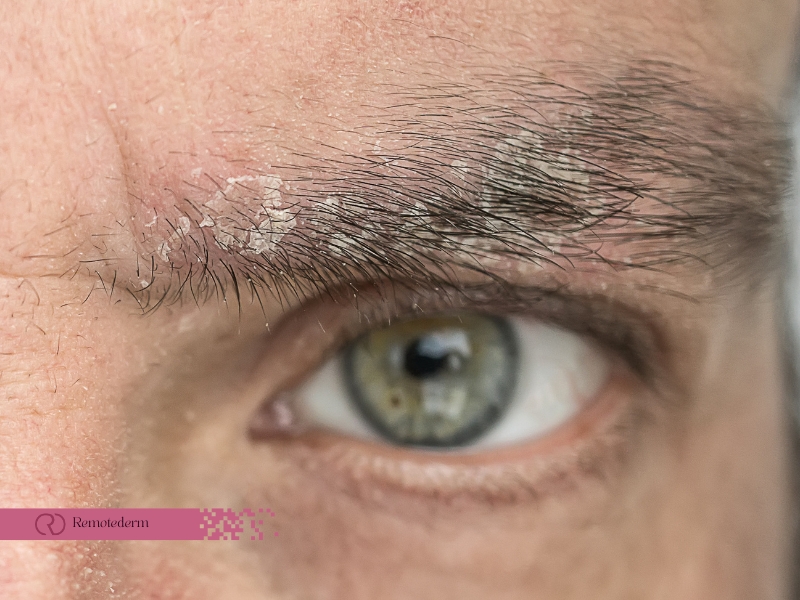Facial psoriasis is a common skin disease that may drastically lower your self-esteem if it affects your face which is a very susceptible part of the body. It is difficult to treat this disease mainly because of the change of weather in Canada. This article aims to uncover the reasons, signs, and successful treatment ways of facial psoriasis so that you can enjoy your life with this problem less.
What is Facial Psoriasis?
Facial psoriasis is a chronic autoimmune disease whose mechanism involves the immune system mistakenly killing off healthy skin cells. This type of psoriasis makes the skin cells turn over too fast, which means many red, scaly patches will be often found in the areas near the eyebrows, forehead, hairline, and the nose.
Common Causes of Facial Psoriasis
Many factors that can trigger or worsen facial psoriasis. These factors include:
- Genetics: A history of psoriasis within a family can increase the chances of developing the disease.
- Stress Levels: A high rate of stress can be a reason for an increase of symptoms.
- Infections: A few specific infections can be responsible for the psoriasis flare-ups.
- Cold Weather: It is not rare in Canada, cold weather can take the moisture out of the skin thus making the skin prone to flare-ups.
Symptoms of Facial Psoriasis
Red, scaly patches are often seen on the forehead, around the nose, and at the hairline in cases of facial psoriasis. These areas may cause discomfort, such as itching and burning sensations. In addition, the skin may become dry and cracked, sometimes leading to minor bleeding.
Can You Get a Facial If You Have Psoriasis?
Yes, but with caution. For those with mild facial psoriasis, it’s possible to get a facial, but it’s important to inform your esthetician about your condition. Consider the following tips before getting a facial:
- Opt for gentle treatments and try to avoid harsh products and aggressive treatments.
- Patch testing technique allows you to test new products on a small skin area first.

Facial Psoriasis Treatment Options
Managing facial psoriasis entails treatment combinations and healthier living. The list below entails some alternatives in Canada.
Topical Treatments
Topical medicine is the first medication considered when it comes to treating patients suffering from mild or moderate facial psoriasis:
- Corticosteroids: The way they reduce the level of inflammation and decrease the production of skin cells is contributory to their effectiveness.
- Vitamin D analogues: They can slow down the growth of skin cells as well.
- Moisturizers: The indispensable ones that protect the skin by ensuring its adequate water level and soothed the skin irritation respectively.
Phototherapy
Phototherapy therapy, light therapy, which helps to diminish inflammatory reactions using ultraviolet light, is particularly popular during the long winter season in Canada when the exposure to sunlight is hardly available.
Systemic Medications
The use case of systemic medications is severe psoriasis symptoms. These medications can be categorized into two:
- Oral medications: A methotrexate-like drug is used for cases that are harder to treat.
- Biologics: These drugs that work against specific immune responses are particularly beneficial for people with severe psoriasis.
Online Psoriasis Treatment
Canada offers online psoriasis treatment service options that have made it possible for you to consult with a healthcare professional from home, making it easier to deal with facial psoriasis without the need for the doctor to be present almost all the time.
Lifestyle Tips for Managing Facial Psoriasis
Implementing a lifestyle change may have a huge effect on the body besides the medical treatment:
- Never forget to put fragrance-free and mild moisturizers on your skin to ensure it is getting enough moisture.
- Gentle skincare products will help to soothe and keep your skin looking fresh.
- The efficacy of yoga, meditation, and similar techniques for stress reduction is proven.
- According to a psoriasis diet guide, the Easiest way to cope with psoriasis is to stick to a diet that consists of anti-inflammatory foods such as fruits, vegetables, and omega-3s, hence the flare-ups will be minimized.

Final Thoughts
Facial psoriasis is a manageable condition, especially with the right combination of treatments and lifestyle adjustments. In Canada, where environmental factors can influence psoriasis, it’s important to stay informed and proactive about your care. With the right approach, you can significantly reduce flare-ups and improve your skin’s health.
FAQs
Can facial psoriasis cause permanent scars?
No, as a rule, facial psoriasis which is taken care of properly does not lead to scarring. In contrast, neglecting skin health may leave skin consequences.
Is facial psoriasis hereditary?
Yes, skin problems like facial psoriasis can be inherited from ancestors. If it is in your family, your risk of developing the disease increases.
Is facial psoriasis natural remedies for the fight? Even though using natural remedies such as aloe vera or omega-3 dietary supplements can help, they should be used as adjuncts, not as substitutes for recommended therapies.
Can psoriasis affect my eyes?
Indeed, psoriasis can also spread to the eyelids as well as nearby regions causing irritation and discomfort. A healthcare provider’s advice is necessary for alternative treatment methods.
